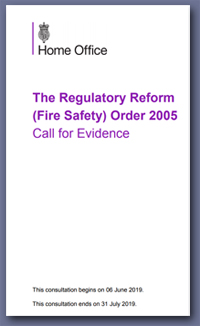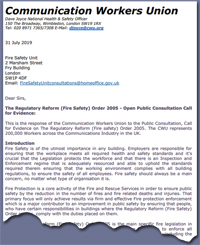Grenfell Tower was destroyed by fire and with it the lives of 72 people, their families, friends and work colleagues.
 Changes in Fire Safety legislation in 2005, which in the view of many actually weakened legislative protection from fire, the lack of detailed and appropriate monitoring of the changes made to the building by private building companies, and dismissal of all concerned raised numerous occasions by residents of the tower block; contributed to the disaster which should never have happened!
Changes in Fire Safety legislation in 2005, which in the view of many actually weakened legislative protection from fire, the lack of detailed and appropriate monitoring of the changes made to the building by private building companies, and dismissal of all concerned raised numerous occasions by residents of the tower block; contributed to the disaster which should never have happened!
The response from Government has been judged by the victims of the fire as inadequate, but it does include a total review of the changes to legislation made in 2005 via the ‘Regulatory Reform (Fire Safety) Order 2005’.
The review is now closed, but ran from
9:30am on 6 June 2019 to 11:45pm on 31 July 2019.
Writing to all CWU Branches via LTB468/19, CWU’s National Health, Safety & Environment Officer Dave Joyce; reported on the Union’s response and that of the TUC to the Government’s call for evidence as part of it’s review:
Following the unimaginable tragedy of the Grenfell Tower fire disaster in June 2017 which killed 72 people, the Government announced that it was determined to do everything it could to stop it ever happening again.
Employers, businesses, organisations and trade unions were asked for their views on fire safety in workplaces as part of a Home Office call for evidence launched last month.
The Home Office public consultation requested feedback on the ‘Regulatory Reform (Fire Safety) Order 2005’, which underpins fire safety in business premises, offices, warehouses, shops and commercial workplace venues, to ensure it is fit for purpose.
The consultation and call for evidence followed publication last year of former HSE Chief Executive Officer, Dame Judith Hackitt’s Independent Review on Building Regulation and Fire Safety, which was commissioned by the Government after the Grenfell Tower fire.
The Hackitt Report warned that without changes to the regulatory system covering buildings, another “catastrophic event” and tragedy like the Grenfell Tower fire could not be ruled out and added that “unless we fix the system, we have no way of guaranteeing that there won’t be another catastrophic event”.
The report recommended:
- A tougher, easier to follow regulatory system.
- A Joint Competent Authority, comprising local authority building standards, fire and rescue authorities and the Health and Safety Executive to manage safety risks.
- Specific requirements on ‘duty-holders’.
- Stronger powers of enforcement to provide a greater deterrent to cost-cutting over safety.
- Tougher penalties to also serve as an effective deterrent.
The ‘Regulatory Reform (Fire Safety) Order 2005’ places legal duties on those responsible for the safety of people using business premises. This is typically employers or business owners, who must carry out fire risk assessments and ensure the safety of staff and others.
 The Government is progressing work on improving the safety of high-rise flats, and through this consultation is looking at the wider building safety landscape, including workplaces. The call to widen the review came from the TUC and trade unions including the CWU.
The Government is progressing work on improving the safety of high-rise flats, and through this consultation is looking at the wider building safety landscape, including workplaces. The call to widen the review came from the TUC and trade unions including the CWU.
To help keep people safe at work, the consultation states that the Government wants to ensure the Fire Safety Order is fit for purpose and to do this, there is a need to understand how it is working on the ground and make informed decisions in the future.
The ‘Regulatory Reform (Fire Safety) Order 2005’ covers all non-domestic premises, as well as the parts of residential buildings used in common, such as corridors and stairwells.
Under the Fire Safety Order, those responsible for fire safety in regulated premises include employers, business owners, landlords, occupiers and anyone else in control of the premises, such as building and facilities managers.
The Fire Safety order also applies to anyone with paying guests, including those who run bed and breakfasts, guesthouses or let self-catering properties, as well as hotels.
These responsibilities include:
- Carrying out a fire risk assessment of the premises and reviewing it regularly.
- Telling staff or their safety representatives about the risks identified.
- Putting in place and maintaining appropriate fire safety measures.
- Planning for an emergency.
- Providing staff with fire safety instructions, information and training.
This consultation runs alongside the Government’s consultation on building safety regulations, “Building a Safer Future”, which was launched simultaneously, led by the Ministry for Housing, Communities and Local Government. The consultation outlines how the Government proposes to take forward meaningful legislative reform in the building safety regulatory system.
The June 2017 Grenfell Tower fire caused the largest loss of life in a ‘residential fire’ in the UK in a century with 72 lives lost. It was avoidable and it should not have happened.
The CWU agrees with the Hackitt Report findings in regard to the weakness of the building safety system. During her review she was told by many experts quote: “We always knew something like this would happen.”
 The CWU, TUC and other unions have campaigned against safety de-regulation and HSE cuts, warning of the consequences. After a decade of relentless government de-regulation, with safety standards characterised as no more than ‘burdensome red-tape’, combined with the chronic under-funding of the enforcement agencies; the Health & Safety Executive, the Fire and Rescue Services, Local Authority Building Control services, compromising their capacity and effectiveness, along with the number of pro-active safety inspections massively slashed, the outcome was inevitable.
The CWU, TUC and other unions have campaigned against safety de-regulation and HSE cuts, warning of the consequences. After a decade of relentless government de-regulation, with safety standards characterised as no more than ‘burdensome red-tape’, combined with the chronic under-funding of the enforcement agencies; the Health & Safety Executive, the Fire and Rescue Services, Local Authority Building Control services, compromising their capacity and effectiveness, along with the number of pro-active safety inspections massively slashed, the outcome was inevitable.
Those wanting to take shortcuts were free to do so – sadly, with a catastrophic outcome.
Our primary concern is to ensure that the Fire and Rescue Service has adequate resources in order to carry out regular inspections and audits of premises and to enforce the legislation at all premises that they inspect and audit, visiting as part of a programme of inspections, and responding to complaints from trade union health and safety representatives, workers or members of the public etc.
The CWU has always strongly believed through our Conference Policies that the prolonged and significant under-funding of the safety enforcement agencies; HSE, LA’s and Fire Services etc., has resulted in a lack of deterrents, enforcement and prosecutions under the Safety and Fire Safety laws.
We greatly value fire safety inspections and audits but the decline in enforcement has seen inspections fall by over 40% in recent years.
You can download a copy of the CWU response to the consultation here It also remains available from the Unionsafety E-Library
You will be able to read the government's response to the evidence gathered here as soon as it becomes available.
Source: CWU / Gov.UK


 Changes in Fire Safety legislation in 2005, which in the view of many actually weakened legislative protection from fire, the lack of detailed and appropriate monitoring of the changes made to the building by private building companies, and dismissal of all concerned raised numerous occasions by residents of the tower block; contributed to the disaster which should never have happened!
Changes in Fire Safety legislation in 2005, which in the view of many actually weakened legislative protection from fire, the lack of detailed and appropriate monitoring of the changes made to the building by private building companies, and dismissal of all concerned raised numerous occasions by residents of the tower block; contributed to the disaster which should never have happened! The Government is progressing work on improving the safety of high-rise flats, and through this consultation is looking at the wider building safety landscape, including workplaces. The call to widen the review came from the TUC and trade unions including the CWU.
The Government is progressing work on improving the safety of high-rise flats, and through this consultation is looking at the wider building safety landscape, including workplaces. The call to widen the review came from the TUC and trade unions including the CWU. The CWU, TUC and other unions have campaigned against safety de-regulation and HSE cuts, warning of the consequences. After a decade of relentless government de-regulation, with safety standards characterised as no more than ‘burdensome red-tape’, combined with the chronic under-funding of the enforcement agencies; the Health & Safety Executive, the Fire and Rescue Services, Local Authority Building Control services, compromising their capacity and effectiveness, along with the number of pro-active safety inspections massively slashed, the outcome was inevitable.
The CWU, TUC and other unions have campaigned against safety de-regulation and HSE cuts, warning of the consequences. After a decade of relentless government de-regulation, with safety standards characterised as no more than ‘burdensome red-tape’, combined with the chronic under-funding of the enforcement agencies; the Health & Safety Executive, the Fire and Rescue Services, Local Authority Building Control services, compromising their capacity and effectiveness, along with the number of pro-active safety inspections massively slashed, the outcome was inevitable.